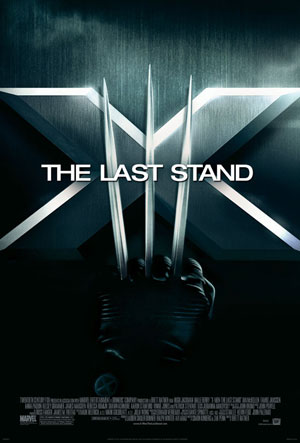 We’re just a few days from the final verdict on X-Men: The Last Stand, the long awaited and feared third X movie, and ostensibly the end of the franchise. Early word has been coming in that the film is not at all the disaster some of us expected, which is nice – not even the most cynical nerd wanted this movie to be bad, no matter who was directing it.
We’re just a few days from the final verdict on X-Men: The Last Stand, the long awaited and feared third X movie, and ostensibly the end of the franchise. Early word has been coming in that the film is not at all the disaster some of us expected, which is nice – not even the most cynical nerd wanted this movie to be bad, no matter who was directing it.
I haven’t seen the movie yet – my screening is Monday night – but after talking to writers Simon Kinberg and Zak Penn last week my expectations definitely went up a notch. Any time you speak to someone involved in a film before its release, you’ll find that they have plenty of good things to say about the movie. Kinberg and Penn, while being positive about the movie, aren’t against being honest about the process and its shortcomings.
It’s kind of weird talking to these guys about this film – CHUD is one of the sites that hasn’t been kind to the movie while it was in production, and Kinberg and Penn read us. People have asked me what happens when celebrities I’ve smack-talked meet me in real life. The honest truth is that the only ones who know who the heck I am are the writers and directors, and they tend to be a little understanding. It’s what we do here.
By the way, keep in mind that Zak Penn wrote and directed one of my favorite films of the 21st century, Incident at Loch Ness. I think it’s entirely brilliant, and you should click here to buy it from CHUD. It’s so cheap that you have no excuse.
Q: One of the most interesting things about this film has been its tortured development process. Were you guys involved from the very beginning, when it was still Bryan Singer directing?
Kinberg: Bryan was going to work with his writers, Dan Harris and Mike Dougherty, the guys who worked with him on X2 and ultimately Superman. I don’t know if those guys ever wrote a word for X3 before Bryan went on to do Superman. Zak and I came on to X3 without a word or a page having been written. We were on from the beginning, but the beginning sort of started after Bryan left.
Q: So you were on when Matthew Vaughn was on.
Penn: We were on before Matthew.
Q: What were the big changes from that period to the finished film? Were there characters you lost, storylines you abandoned? Penn: There always is. And yes, there were definitely things we toyed with and ultimately didn’t use. Certainly Matthew had some very specific opinions which, after he left we discarded, but many of which we actually kept. There’s still plenty of stuff that Matthew sat in a room with us and talked about that still made it in the movie. But we locked in to a story –which I know there’s been a lot of controversy about – and we did stick with it one way or another. We went through many drafts and variations.
Penn: There always is. And yes, there were definitely things we toyed with and ultimately didn’t use. Certainly Matthew had some very specific opinions which, after he left we discarded, but many of which we actually kept. There’s still plenty of stuff that Matthew sat in a room with us and talked about that still made it in the movie. But we locked in to a story –which I know there’s been a lot of controversy about – and we did stick with it one way or another. We went through many drafts and variations.
Kinberg: There’s never been a radical overhaul of the script. There certainly have been changes in terms of the character arcs, and some very secondary characters were introduced after Matthew’s departure. But from the beginning it was always two parallel storylines, one being the Dark Phoenix saga, which is the emotional side of the film, and the other being the cure, which is the political throughline of the movie. Those two things were working in concert when Matthew was working on the movie and when Matthew wasn’t working on the movie.
Q: I guess the image of screenwriters is often that you come on, write a script and the production ignores you afterwards –
Kinberg: That’s pretty well founded!
Penn: That’s too true.
Q: When you’re working on a film like this, when directors change in pre-production and they’re rushing to hit a release date, how does your role in the film change? Did you guys stay involved heavily throughout production?
Penn: We did. Normally you do get kicked to the curb immediately, but because of the way the movie happened Simon and I never got rewritten and we were on the movie til the end.
Kinberg: It’s a unique thing that in a movie of this size – any movie in the studio system, but especially one of this size – the continuity was Zak and I, because like you said the directors changed and elements changed, but Zak and I were there from the start of the film. Brett is an incredibly inclusive director who not only welcomed but in some ways needed our input during the process of the production. We were very intimately involved in making the movie.
Penn: This is something that a lot of people online don’t get. We’ve been doing Q&As online, and I read your site and all the other sites, and have since you guys started. One of the things people don’t realize is that the real hobgoblin of the whole system is the treadmill of writers. When you have twenty writers working on a script and they keep coming in and out, you can be sure that there’s going to be no vision behind the movie, no matter how good the director is. People lose sight of that, they think that it’s all about who the director is, or who the particulars who are involved, but the main thing is keeping the same people who were working on it from the beginning to the end, so that you don’t end up with some horrible blender version of a screenplay.
Q: Why does that happen?
Penn: Because people are dumb. People are really dumb. [laughs] No, you know what? It’s a very long, complicated – it has a lot to do with the studio system breaking up in the 50s, but it’s a very inefficient system. My wife is a studio executive, and Simon’s is too, and I talk to her and it’s a very inefficient system, and it very rarely works.
Q: When did the idea of this being the last X-Men film come in, and why did it come in? Out of all the comic book franchises, X-Men seems the most open-ended because there are thousands of characters.
Kinberg: I think the idea of it being the last one of the entire franchise came in during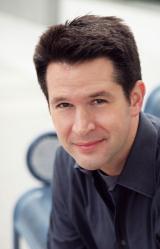 post-production/marketing. I think the truth is it’s the last of this trilogy. We look at this as it’s the third chapter of a book with three chapters, but there could be other books. There are thousands of characters, and there are even characters that exist in the movie universe now that could be pursued for future films, but we looked at it as, how do we close up and complete the arcs, the conflicts and issues that Bryan started in the first two movies to make this feel like a complete story.
post-production/marketing. I think the truth is it’s the last of this trilogy. We look at this as it’s the third chapter of a book with three chapters, but there could be other books. There are thousands of characters, and there are even characters that exist in the movie universe now that could be pursued for future films, but we looked at it as, how do we close up and complete the arcs, the conflicts and issues that Bryan started in the first two movies to make this feel like a complete story.
Penn: Right. But we definitely were not sitting there writing the script thinking – the whole last stand, that this is the last movie coming out, it didn’t come from us. To put it politically.
Q: When you guys were writing the script, how much did you have to take into account the actors’ interest in returning? Without giving too much away, some of the characters don’t make it to the end of the film – how much of that came from the creative end, and how much of that came from Actor A only wanting to do a week on the film?
Kinberg: As with every studio assignment, which is what this was, it wasn’t a spec script or something Zak and I dreamed up – it was an assignment to write the sequel to an adaptation of a comic book – we were given certain parameters about certain characters. Those parameters had to do with actor availability and/or studio politics. We worked within those parameters within the best of our ability to give those characters and those actors the best scenes we could write for them. And the most scenes we could write for them, because the truth is Zak and I more than anybody else – I can honestly say – more than anybody else in the process of making X3, Zak and I are the most religious fans of the comic books. We were looking not so much to protect the first two movies, although we wanted to honor the tone of those movies, but to protect the comic, and we were very precious about those characters because we have a different relationship to them than some people do.
Penn: We get asked this question all the time online, and once the movie comes out we’ll probably have to deal with people running up to us on the street. The thing is this: it’s a movie and the actors are human beings and get paid huge salaries and it’s incredibly complicated and expensive; it’s not a comic book. It’s not like when Brian Bendis decides to change the continuity in some comic book – if we wanted to follow the comic book literally and religiously, it would be physically impossible. We wouldn’t have the actors, we wouldn’t have the studio to make it.
There were choices – some were made for us, having to do with actor availability and also studio preference, and there were some that in the first two we took liberties with the comic books and they worked better on screen and that’s the way we had to keep them. I always say to people who ask, ‘Why would Fox rush this movie?’ I try to explain to them would you rather recast Magneto and Professor X because those actors are doing plays in England when you want to go? It’s not like Mission: Impossible where you get Tom Cruise and reassemble the cast around him. With this you have to assemble so many actors that have such tough schedules to begin with.
Q: How do guys deal with all the internet nonsense, including from sites like CHUD?
Kinberg: Not well! Honestly, and I’m going to be honest about this, it keeps us up at night. We were talking the other day about how we have to disengage a little bit, because it’s stressing us out too much. I say this affectionately, but we’re geeks. We’re fanboys; we grew up reading comics, we read those sites religiously, even when it has nothing to do with what we’re doing. So when we read something good on your site or Aint It Cool or Superhero 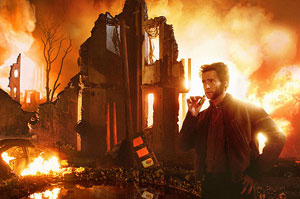 Hype or any of these sites, we get excited. And when we read people freaking out or wanting to kill Brett Ratner or whoever for whatever reason, it’s upsetting. We try to understand that there are going to be millions and millions of fans out there who are going to be happy with the movie and others who are going to be unhappy and we have to survive that. But it’s tough.
Hype or any of these sites, we get excited. And when we read people freaking out or wanting to kill Brett Ratner or whoever for whatever reason, it’s upsetting. We try to understand that there are going to be millions and millions of fans out there who are going to be happy with the movie and others who are going to be unhappy and we have to survive that. But it’s tough.
Penn: It’s also tough because when we read the sites there are things people say about the filmmaking process and about Hollywood that are completely accurate. There are times that Simon and I wish we could go on there and say, ‘We agree with you. Fuck the system, this is fucked up!’ It’s not like Simon and I are sitting there and boom! here’s our next assignment, X-Men, best get to it. You fight for the job and you take it on knowing it’s going to be difficult. There are choices where you do what needs to be done and you try to make it the best that you can and preserve what’s good about it or you quit and someone else is going to do exactly what the studio wants them to do, or exactly what the director wants them to do. As a writer you find yourself in a weird position where you go online and you see people saying, ‘I didn’t want them to do this to this character’ or ‘I did want them to do this to this character’ or ‘I want Gambit to be in the movie,’ that’s not how it works. It’s not a comic book. We can’t just sit there and say, OK, let’s do Gambit, and we’ll go after so and so to star in it.
Q: This has been going on for as long as there have been movies, and it’s not just from fans but from critics in that there’s not a lot of understanding of what a writer’s position on a film really is. You’ll read reviews that take the writer to task, but often there’s no relationship between what the credited writer handed in and what’s on screen.
Penn: All you need to do is look at my credits and you’ll see a battlefield littered with the corpses of my original ideas.
Kinberg: I will say one thing about X3, and it’s that we had the real pleasure of having been there from beginning to end. We had to make compromises to stay in that position, but we also had to fight fights. We won some of the fights we were forced to wage – not all of them, and we look at the movie and see the fights that we lost and they upset us in the ways that they might upset some fans. But we won the majority of the wars we waged, and those wars were waged based on our love of the comics.
Penn: We won the war but lost some battles along the way. Have you seen the movie yet?
Q: They did not let me into the screening. No.
Penn: Here’s the thing, you’ll see the movie and judge it for yourself. I’ll stand behind it – if you asked me about twenty other movies I worked on I would say, ‘That’s a piece of shit, don’t go see it.’ X3 is a good movie. Whether you’ll think it’s great or whatever, I don’t know. But here’s the thing, fundamentally it’s telling the Dark Phoenix story, which is one of the most dark and complicated stories that have ever been in a comic book. It’s pretty crazy that they made a 200 and whatever million dollar movie with that as a central story. Just the fact that we were able to accomplish that and get that story told on screen with whatever changes were made, I’m really proud of that. It’s really difficult to get studios to make anything other than heroes fighting a bad guy and killing him in the end.
Kinberg: I would have to say one of the things that has been so effective about the movies is the grey areas the characters inhabit; the fact that there’s no ultimate and pure evil and no ultimate and pure good. This is probably the grayest – bad pun intended – of the three movies, and at the heart of the movie is this destructive, empathetic, schizophrenic character. Those are usually characters you see in Capote or Ordinary People; those aren’t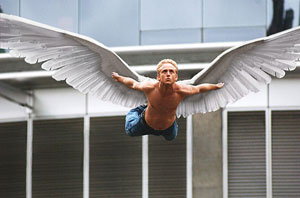 characters you see in X-MenX-Men 3 coming out Memorial Day.
characters you see in X-MenX-Men 3 coming out Memorial Day.
Penn: So take that, TalkBackers!
Q: Zak, you start pre-production tomorrow on your new poker movie.
Penn: The Grand.
Q: And you have Werner Herzog back for that.
Penn: I do have Werner back.
Q: Is this going to be a series of The Adventures of Werner Herzog?
Penn: Seriously, if I could get someone to fund me making a series of movies about Werner Herzog alone I would do it. He’s one of my personal heroes but I also think he’s just an amazing person to watch on screen.
Kinberg: He’s an amazing character.
Penn: As an actor I think he’s fantastic. I would have put him in X3, he would have been great. I don’t know what part. Maybe Gambit.
Q: Are you worry that he’s overshadowing your films, though? He’s saving Joaquin Phoenix from car crashes, he’s getting shot at…
Penn: My friends all joke that he’s like a superhero. I’ve been very privileged to get to know Werner and hang out with him, and I helped to write the movie he shot in Thailand with Christian Bale, Rescue Dawn. One of the things you learn about him is that you cannot make up stuff about him that will be as interesting as what really happens to him anyway.
By the way, I know this is crazy, and I’ll probably be crucified somewhere, but in that way that’s probably the only similarity between him and Brett Ratner. If we told you the crazy stuff that happens to Brett or happens around Brett, you would just say I was making it up.
Q: Could Brett Ratner be the star of your next mockumentary?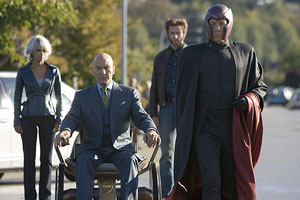 Penn: Brett’s going to be in The Grand.
Penn: Brett’s going to be in The Grand.
Q: Who else is in it?
Penn: Right now it’s Woody Harrelson, Ray Liotta, David Cross, Richard Kind, Werner Herzog, Simon Kinberg will have a small part, a whole part of other people – Jason Alexander, Fred Armisen. It’s a big cast.
Q: Simon, what’s next for you?
Kinberg: A couple of things. I’m in Rome right now. I just flew in a couple of hours ago. I’m writing and producing Doug Liman’s next movie, a film called Jumper. It’s based on a series of young adult novels about a teenaged teleporter. We start shooting in a month in New York, Rome, Toronto and Tokyo. So I’m in Rome this week and maybe Tokyo next week scouting.
We’re also doing the Mr. and Mrs. Smith TV show.
Q: I had heard about that and I was curious how you were going to make that work as a weekly series.
Kinberg: It’s going to be more of a Moonlighting or a Hart to Hart or a Remington Steele with some Alias. It’s a show about a marriage – two people trying to balance their home life with their work lives, and their work lives happen to be international assassins. They go out from week to week on missions, and then try to balance with whatever the issue at home is. Frankly it works better as a TV show. We struggled with the movie narratively, as it loses its theme in the third act a little bit. The idea is better suited for a weekly series in some ways. The way we pitched it is Married With Children meets Alias.
Q: But they’re going to know that they’re both spies.
Kinberg: Yeah, it’ll be after the movie. They know what each other does for a living but they’re not partners. There are some times they work together on missions, sometimes they work apart. Sometimes they work in the same cities, sometimes they compete.
Penn: Is Gambit going to be in it?
Kinberg: Gambit is going to have a very big role in the mythology.
Then there’s something else I’m going to write soon, another spy movie for Nicole Kidman, for our friends at Fox.
Q: Do you guys now hate Gambit?
Penn: [laughs] Oh my God, so much. No, we don’t hate Gambit! We love Gambit. It’s just hard to work him in.
Kinberg: You know what, honestly, there’s a lot of characters in this movie but the reason Gambit’s not in this movie is that we like him too much. We didn’t want to give him a cameo or three scenes, we wanted to give him the kind of role that Beast has in this movie or Nightcrawler had in the second one, a real feature role. And there wasn’t room for a feature role in this particular story. He didn’t fit in with the Phoenix or the cure.
Penn: We had a cameo for him in the prison, but we cut it. Even the Marvel guys… Kevin Feighe, who by the way deserves some of the credit for this. We say we’re the only continuity, but he’s the other person who’s even more religious about the comics. But Kevin pulled us aside and said, why are we even doing this? It’s not going to make Gambit fans happy because there’s no relationship with Rogue, and there’s no way we could work it in. And by the way, it’s not like there was an actor who was the perfect person to play Gambit, and once you introduce him you’ll want to bring him back again and again. As opposed to throwing Callisto in there – although I guess there are some rabid Callisto fans out there – but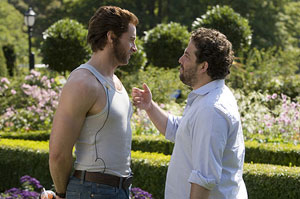 we felt like we could throw her in and do what we needed her to do and not worry about it, but with Gambit we couldn’t do that. People would be furious because the character is so popular.
we felt like we could throw her in and do what we needed her to do and not worry about it, but with Gambit we couldn’t do that. People would be furious because the character is so popular.
Kinberg: Honestly we would be furious. He’s a character both really like, and it we wouldn’t want to give the two or three scenes to this rich character that the movie could afford.
Q: So are you guys done with the X-Men universe? I know Fox is looking at spin-off films – will you come back for one of those, or did you do your time?
Penn: I’m actually supposed to write and direct one of the spin-offs, but I can tell you I can’t do it immediately because I’ve had enough of the X-Men for a little while. A lot of the characters I loved and grew up with have been introduced in these movies, but one of things – and I know this is contradictory to the marketing campaign – but one of the reasons X-Men is so much more powerful and so much more attractive than so many other superhero franchises is that it’s not about a superhero, it’s about a world. It’s about this alternate science fiction universe. To me the school itself is the star. I’ve always felt that the idea of Xavier’s School for the Gifted – and I may be biased, because I read the first issue first – but it always seemed to me that that was what the world was about, and any of the characters could work in that world as long as you keep that central idea.
So I will have to jump back into that eventually, and I am writing the Hulk sequel right now. I don’t know how the hell I’ll do that in time, but whatever. Soon I’ll come back to the X-Men universe because I love it.
Kinberg: Yeah, I think I will also eventually. I needed to take a break – it’s been years since I wrote an original script, and it’s such a different relationship for me as a writer when you write an original as opposed to an adaptation or a sequel. Which is why I won’t be doing an X-Men or a superhero movie for at least six or nine months or so.